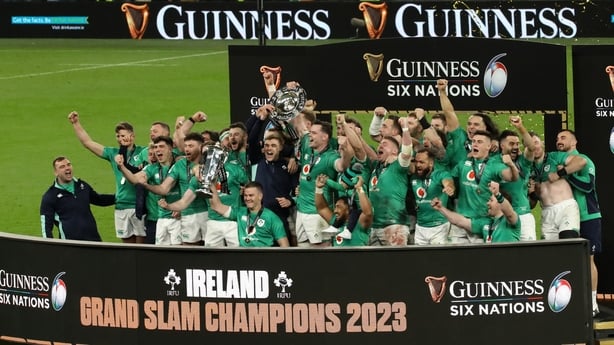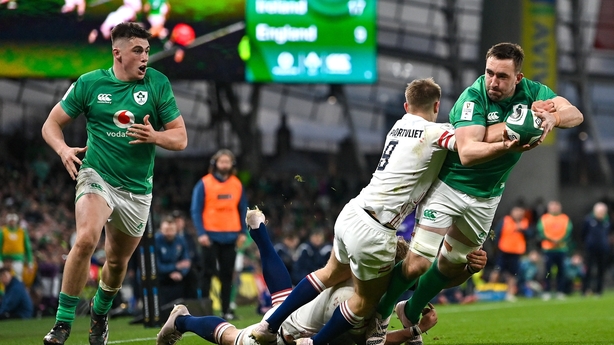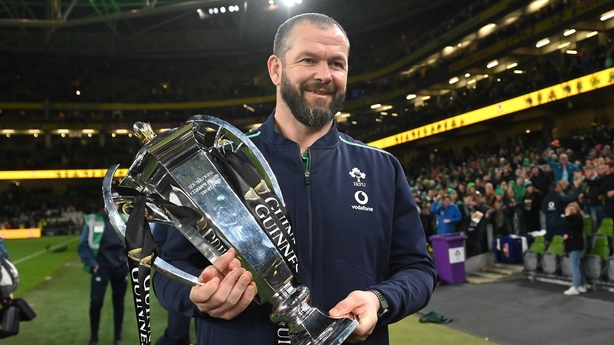Ireland won the Grand Slam on Saturday evening but, in truth, and by their own standards, they limped towards it in the end.
Their dominance of the tournament was almost complete, accumulating 24 out of a possible 25 points along the way. And if it weren't for one fatigue-laden pass from James Ryan, Ireland could have had a perfect score, only just missing out on the bonus point against Scotland.
Nobody came close to Ireland realistically, although there were some nervy moments along the way. Tight half-time scorelines against Scotland and England will soon be forgotten, trumped by the detail that no team came within a score of Ireland on the way to their first Grand Slam win in Dublin and only their fourth ever.
Victory in the Six Nations in a World Cup year and domination of the world rankings has put a target on their back.
The southern hemisphere teams are waiting in the long grass for Ireland and they’ll be planning their strategies around how best to disrupt the Irish gameplan during their preparations for the World Cup.
There are nervous whispers of Ireland peaking too soon because Irish people aren’t used to being the frontrunners, but Andy Farrell is attempting to change that mindset.
If Ireland go on to disappoint in the World Cup, it won’t be because they were too successful in the Six Nations. Building confidence, resilience and gaining a psychological edge against opponents can hardly be seen as a negative.

If you watched Ireland last weekend and surmised that they had peaked, you would be setting a low standard for this team.
Maybe it was due to nerves, or maybe there’s just more to come from them, but Ireland were far from their best in the Aviva on Saturday evening.
Perhaps it was the occasion, or the expectations entailed by playing at home on Paddy’s weekend against their biggest rivals which triggered more nerves than the game should have warranted.
Poor decision-making in the English 22, worse handling errors and a lack of clinical finishing have not been typical of Ireland as a whole across the competition.
Their best performance was undoubtedly the French game, and since then both Scotland and England caused enough problems to force Ireland into dogfights.
Farrell, Mike Catt, Paul O’Connell and others will have some time off to revisit their strategy, which will need to take another step up before World Cup success can be a realistic target.
The game that they played in the Six Nations will be figured out by September, and so another effort must begin.
If you watched Ireland last weekend and surmised that they had peaked, you would be setting a low standard for this team.
Ireland used 32 players across the Six Nations; the squad won’t change much between now and their World Cup prep.
There are less than a handful of decisions to be made but even within this squad, there are improvements that need to be made.
Tadhg Furlong wasn’t at his best on Saturday evening. You’d rarely find a scrum penalty given against Ireland’s tighthead and he was responsible for at least three handling errors in the first half that disrupted the Irish attack.
Usually, Furlong punches well above his weight in terms of attacking prowess, whereas last weekend something was a bit amiss. It doesn't happen often and we can expect quick improvements from him.
The second row - although both starters performed very positively - will be boosted by more competition once the injured Iain Henderson and Tadhg Beirne return.
Both will have a huge impact on Ireland’s World Cup and have made big plays in high pressure games in the past.
Those positions are a huge source of strength for Ireland, but will become stronger when all four of those players are vying for three positions in any World Cup game.

Ireland’s back row is performing at a world class level, with Jack Conan now back in form and pushing the starters. There won’t be a huge improvement in this area of the pitch if they were to play a knockout game in the morning.
The backline has been in scintillating form. There won’t be a massive improvement across the backs either because they are playing so well.
The only area where there is room to kick on is in cementing a centre partnership, given Ireland’s chopping and changing throughout the Six Nations with injury, availability and selection changes.
Bundee Aki looks to be in control of the inside centre position for now. On the back of his fine performance on Saturday, it would be hard to swap him out. Garry Ringrose will undoubtedly be Ireland’s outside centre but there may be time yet for Robbie Henshaw to stake a claim at either of the two positions.
Farrell has built so much depth in his squad that this is no longer an issue should Ireland get to a World Cup quarter-final.
Bar the obvious omissions of the likes of Johnny Sexton or Furlong - and possibly Dan Sheehan and Caelan Doris as well at this point - Ireland can swap players in and out without any real fear.
So where can Ireland improve? Based on Saturday’s performance, Ireland can go back to dominating the setpiece. A couple of misfiring lineouts and a couple of scrum penalties from the weekend would put you under ferocious pressure against the likes of France, South Africa or a World Cup primed New Zealand.
England’s setpiece wasn’t even that imposing, so Ireland will need to go back to the drawing board when the big games come in September and October.
Attack coach Catt will be displeased with Ireland’s efficiency in the opposition 22. Usually a strength of the side, it became a weakness by Saturday night. A quick tap penalty that was held up, misplaced passes, poor offloading decisions and a couple of inaccurate kicks disrupted the Irish attack.
That attack is built on accurate breakdown work and England certainly exposed some weakness in Ireland’s ground game, turning over two balls in the first five minutes and causing trouble throughout, even with 14 players in the second half.

That's not to be overly critical of Ireland. They almost cruised to Grand Slam success.
However, to be able to do so while there are still areas to improve on shows that Ireland haven’t yet peaked and there’s still a long way to go before they can go into the World Cup with a favourites tag hanging over their heads.
Donning that tag going into a Six Nations tournament which they have won in the recent past, and bearing it going into a World Cup - a tournament in which Ireland have historically struggled - are two very different prospects.
Farrell has a few months' worth of preparation to make this Irish side even stronger mentally, with a strategy that is two more steps beyond that which won them the Grand Slam.
Irish rugby is in a great place but hopefully there’s more to come.


